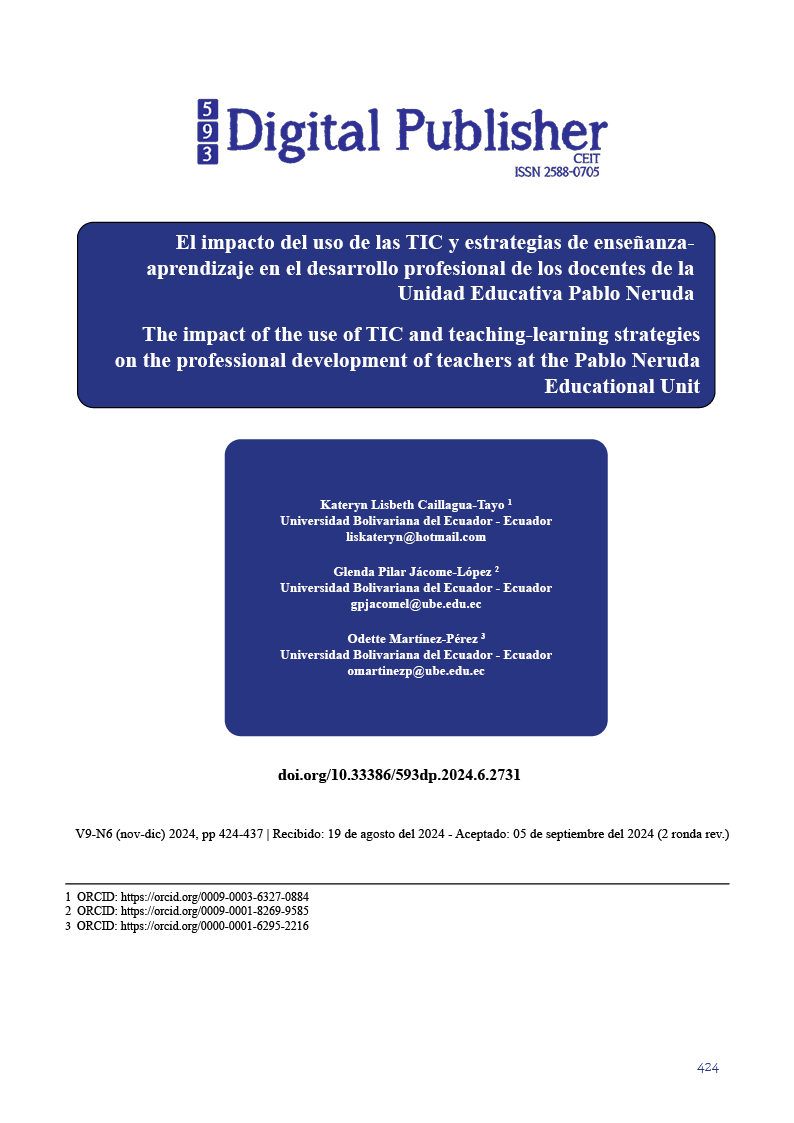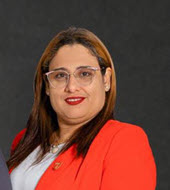The impact of the use of TIC and teaching-learning strategies on the professional development of teachers at the Pablo Neruda Educational Unit
Main Article Content
Abstract
This study investigates how Information and Communication Technologies (TIC) and teaching-learning strategies promote the professional development of teachers at the Pablo Neruda Educational Unit, focusing on how teachers integrate TIC to improve their educational practice by adapting them to the curriculum and the social context.
TIC has transformed the educational dynamic by expanding learning spaces, improving communication between teachers and students, promoting social inclusion and facilitating equitable access to educational content, to promote the development of multiple skills in students.
The study has a mixed approach, combining quantitative and qualitative methods, for the analysis of data collected through surveys and interviews that were conducted with the teaching staff, on how they adapt to TIC, both the benefits and challenges of its implementation and the contribution to their professional development.
The results indicate that, although teachers frequently use TIC in their educational practices, they face significant challenges such as limited technological infrastructure and lack of ongoing training. These limitations affect the effectiveness of technological integration, highlighting the need to improve technological resources and offer ongoing training that promotes professional development.
It is concluded that the effective integration of TIC and innovative pedagogical strategies is essential for the professional development of teachers, promoting educational innovation and improving educational quality at the Pablo Neruda Educational Unit.
Downloads
Article Details

This work is licensed under a Creative Commons Attribution-NonCommercial-ShareAlike 4.0 International License.
1. Derechos de autor
Las obras que se publican en 593 Digital Publisher CEIT están sujetas a los siguientes términos:
1.1. 593 Digital Publisher CEIT, conserva los derechos patrimoniales (copyright) de las obras publicadas, favorece y permite la reutilización de las mismas bajo la licencia Licencia Creative Commons 4.0 de Reconocimiento-NoComercial-CompartirIgual 4.0, por lo cual se pueden copiar, usar, difundir, transmitir y exponer públicamente, siempre que:
1.1.a. Se cite la autoría y fuente original de su publicación (revista, editorial, URL).
1.1.b. No se usen para fines comerciales u onerosos.
1.1.c. Se mencione la existencia y especificaciones de esta licencia de uso.
References
Cabero, J. & Martínez, A. (2019). Las tecnologías de la información y la comunicación y la formación inicial de los docentes: modelos y competencias digitales. Revista de currículum y formación del profesorado, 248-249.
Cardozo, M. (2022). Uso de las TIC en el proceso de enseñanza- aprendizaje. Ciencia Latina, 30. doi: https://doi.org/10.37811/cl_rcm.v6i6.4002
Cea, L. M. (2024). El Impacto de las Tecnologías de la Información y la Comunicación en la Sociedad Actual: una Mirada desde la Sociología y la Filosofía. CEABAD: https://ceabad.com/2024/06/03/impacto-de-las-tic-en-la-sociedad/
Cedeño y Zambrano . (2023). Vol. VIII. Año 2023. Edición Especial 1 (marzo)73Integración de las Tecnologías de Información y Comunicación en el proceso de enseñanza-aprendizaje. Revista Cognosis, 74. doi:https://doi.org/10.33936/cognosis.v8iEE1.5615
Flores, F. A. (2019). Fundamentos epistémicos de la investigación cualitativa y cuantitativa: Consensos y disensos. Scielo. doi:https://orcid.org/0000-0002-0144-9892
García Sánchez, M. d., Reyes Añorve, J., & Godínez Alarcón, G. (2017). Las Tic en la educación superior, innovaciones y retos. Revista Iberoamericana de las Ciencias Sociales y Humanísticas, 12.
Granados, A. (2015). Las TIC en la enseñanza de los métodos numéricos. Sophia Educación, 11(2), 143-154.
Granda Asencio, L. Y. (2019). Las TICs como herramientas didácticas del proceso de enseñanza-aprendizaje. Conrado, 104-110.http://scielo.sld.cu/scielo.php?pid=S1990-86442019000100104&script=sci_arttext&tlng=en
Hernandez et al. (2016). Competencias TIC para el desarrollo profesional docente en educación básica. Praxis & Saber. doi:https://doi.org/10.19053/22160159.5217
Hernandez y Ronald . (2017). Impacto de las TIC en la educación: Retos y Perspectivas. Propósitos y Representaciones, 325 - 347. doi:http://dx.doi.org/10.20511/pyr2017.v5n1.149
Hernandez, R. M. (2017). Impacto de las TIC en la educación: Retos y Perspectivas. Propósitos y Representaciones, 5(1), 325 - 347. doi:http://dx.doi.org/10.20511/pyr2017.v5n1.149
Matthew J. Koehler, P. M. (2015). ¿Qué son los Saberes Tecnológicos y Pedagógicos del Contenido (TPACK)? Virtualidad, Educación y Ciencia, 60-70.
Mera, R. (2020). Uso de tecnología de información y comunicación y su relación con el aprendizaje significativo en el área de matemática en los estudiantes del VII ciclo de la institución educativa secundaria Esteban Quevedo Chávez de Puerto Esperanza. Ciencia Latina, 17.
Narváez et al. (2017). Evaluación del software educativo Mundo Agroforestal con jóvenes rurales de Nariño, Colombia. Información tecnológica. Revista Latina, 135-140. https://www.scielo.cl/pdf/infotec/v28n2/art15.pdf
Pinto, G., & Plaza, J. (2021). Determinar la necesidad de capacitación en el uso de las tecnologías de la información y las comunicaciones para la formación docente. 593 Digital Publisher CEIT, 169-181. doi: https://doi.org/10.33386/593dp.2021.1.426
Romero, A. (2023). INNOVACIÓN EDUCATIVA Y DESARROLLO DE HABILIDADES EN EL SIGLO XXI: ESTRATEGIAS, CAPACITACIÓN Y TRANSFORMACIÓN DIGITAL EN LA EDUCACIÓN. Universidad ECOTEC, 34- 36. https://libros.ecotec.edu.ec/index.php/editorial/catalog/download/99/151/1345-1?inline=1
Samper, M. (2019). La Transformación del Aprendizaje con el uso de Tecnologías Educativas. Obtenido de The Dialogue: https://www.thedialogue.org/blogs/2019/10/la-transformacion-del-aprendizaje-con-el-uso-de-tecnologias-educativas/?lang=es
Suárez y Custodio. (2014). Evolución de las tecnologías de información y comunicación en el proceso de enseñanza-aprendizaje. Revista Vínculos, 209-220.
UNESCO. (2015). Organización de las Naciones Unidas para la educación, Ciencia y la Cultura. Agenda 20230 Para el Desarrollo Sostenible. https://unesdoc.unesco.org/ark:/48223/pf0000233352
Villón Tomalá, A. y. (2019). TIC en la educación: nuevos ambientes de aprendizaje en la enseñanza de las Ciencias Sociales. Analysis. https://studiahumanitatis.eu/ojs/index.php/analysis/article/view/59




